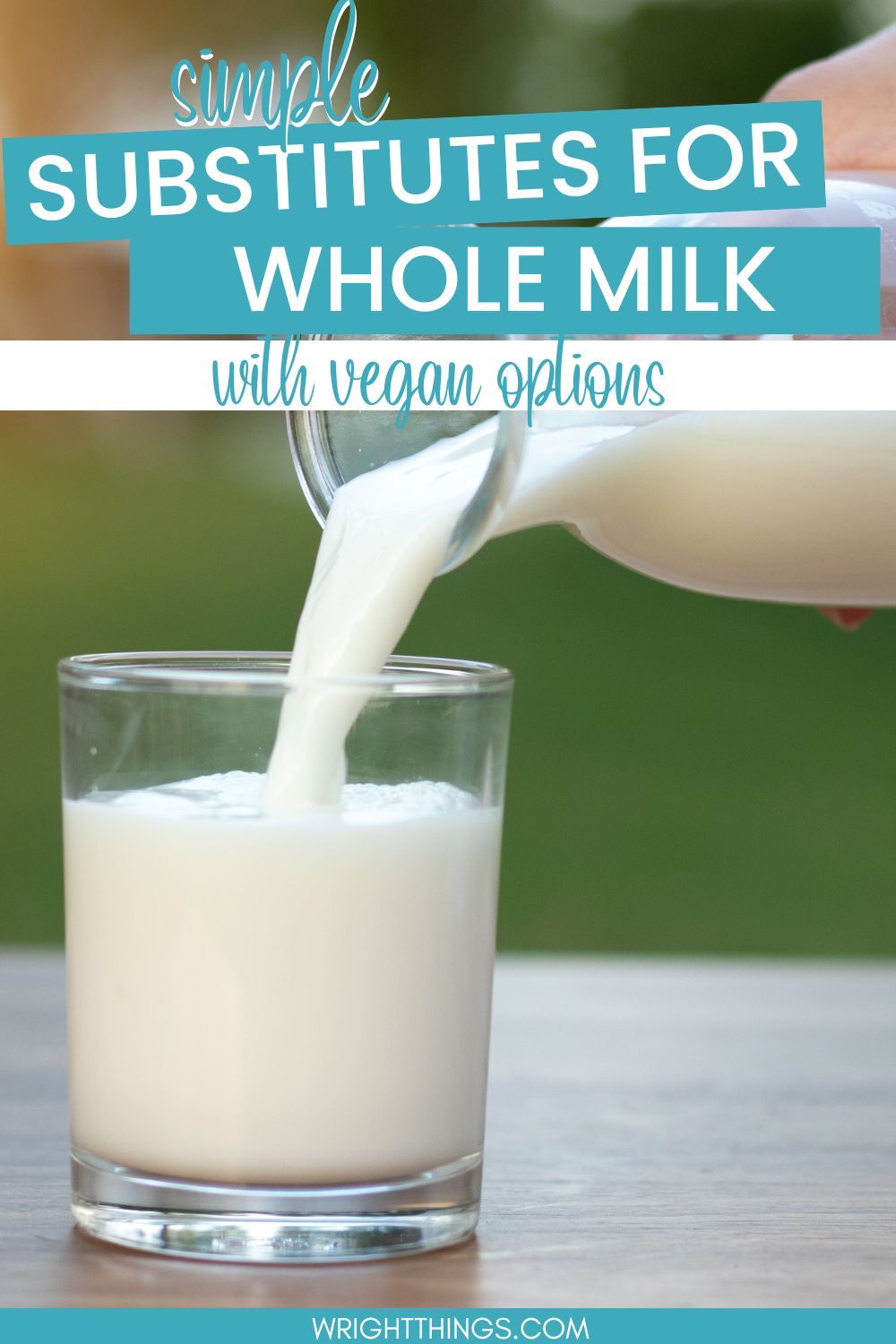Whole milk is a type of milk that contains all of the nutrients that are found in milk. This includes fat, protein, carbohydrates, vitamins, and minerals. Whole milk also contains cholesterol and sodium. Whole milk is a good source of calcium and vitamin D. It is also a good source of protein and phosphorus.
Whole milk is higher in fat than other types of milk, such as skim milk or low-fat milk. The fat content of whole milk can range from 3% to 6%. Whole milk has a creamier taste and texture than other types of milk as well.
A lot of people are looking for a whole milk substitute because they want the benefits of whole milk without all of the fat. Whole milk is a good source of calcium and vitamin D, but it is also high in fat. This can be a problem for people who are trying to lose weight or who are concerned about their cholesterol levels.
Others are looking for substitutes for milk that are not milk based due to allergies or preferences. The good news is there are many substitutes for milk that are vegan and allergy friendly.
Perhaps you have simply run out of whole milk, and are looking for a quick replacement, no matter the case there are many substitutes out there.
First we will cover dairy based options, and then vegan options. No matter your reason for milk replacement, we have something to suit your needs on this list.
Dairy Substitutes for Whole Milk
Some dairy-based substitutes for whole milk include:
Skim milk
Whole milk can be substituted with skim milk by using a 1:1 ratio. Skim milk is a helpful substitution for those who are trying to watch their calorie intake or are lactose intolerant. Skim milk has the same nutrients as whole milk, but contains less fat and calories.
Low-fat milk
Skim milk can be used as a substitute for whole milk in many recipes. It is lower in fat and calories, and has the same amount of protein as whole milk. To make a 1:1 substitution, use the same amount of skim milk as you would whole milk. If the recipe calls for more than 1 cup of milk, you can either replace all of the milk with skim milk, or mix it with some whole milk to get the desired consistency.
2% milk
Most people recommend using 2% milk as a substitute for whole milk in most recipes. The milk has a lower fat content, so it won’t make your recipe as rich and creamy as if you were to use whole milk, but it will still work well in most cases. You can also try using skim milk or 1% milk as substitutes, but the results may not be as good.
Full-fat yogurt
There are a few substitutes for whole milk that can be helpful in baking. One is full-fat yogurt, which can be used in place of cow’s milk in many recipes. It has a similar consistency and thickness, and also adds a touch of tangy flavor. You can also use Greek yogurt. But, this may be thicker in consistency and will need to be thinned out just a tad to get it to the proper consistency for your recipe. If you use either of these options, be sure to get a plain yogurt, not a flavored one.
Butter
Butter can be substituted for whole milk in most recipes. For every cup of whole milk called for in a recipe, use 1/2 cup of butter instead. This substitution works best for baking recipes. When using butter as a substitute for milk, make sure the butter is at room temperature so that it will mix smoothly with the other ingredients.
Butter is also a great addition when you are using a lower fat milk as a substitute for whole milk. Adding some butter will help add more fat to the dish, and get closer to the effect of whole milk.
Cream
In some recipes, cream can be substituted for whole milk. This will add richness and creaminess to the dish. Consider diluting the cream with water to get closer to the texture of whole milk.
Sour Cream
This is a great dairy product replacement for whole milk as it has a similar texture and consistency. It’s slightly thicker, but can be used in a 1:1 ratio replacement in a recipe.
Half and Half
Half and Half is great whole milk alternative. It’s something many people already have on hand and can be used in just about any cooking or baking recipe that calls for whole milk. If you want to use it, use 3/4 cup of half and half plus a 1/4 cup of water to replace the 1 whole cup of milk in the recipe. Adjust as needed if your recipe calls for a different quantity.
Evaporated Milk
This can be a good option to use instead of milk. It’s a little thicker than whole milk so you’ll need to use some water to help thin it out. We recommend using a half water, half evaporated milk ratio for however much whole milk your recipe calls for to get it to the right consistency.
Dairy Free Vegan Substitutes for Whole Milk
If you are vegan or have a milk protein allergy, you may be looking for non-dairy options or other milk alternatives. Now let’s take a look at some non-dairy substitutes for whole milk. Anything on this list is fantastic not only for using in recipes and cooking, but for drinking as well! These plant based alternative are great for any use case.
Soy milk
Soy milk is a good substitute for cow milk because it has a similar consistency and nutritional value. Soy milk is fortified with calcium and vitamin D, which are important nutrients for maintaining bone health. It also contains protein, which is beneficial for muscle growth and repair. Another important thing that soy milk offers is the fact that it has a neutral flavor and will not change the final outcome of your recipe.
Almond milk
Almond milk is a good substitute for milk because it is low in calories and fat, and it contains essential vitamins and minerals. It also has a nutty flavor that many people enjoy. Additionally, almond milk is a good source of protein and fiber. However, almond milk typically is thinner and is closer in resemblance to water in consistency. So keep that in mind if you choose to use this in place of whole milk with a higher fat content and slightly heavier or thicker consistency. Also, be sure to use unflavored, unsweetened almond milk.
Rice milk
Rice milk is a good substitute for milk because it is low in calories and fat, and it contains essential vitamins and minerals. Additionally, rice milk is a good source of protein and fiber. Rice milk also has a slightly sweet flavor that many people enjoy.
Coconut milk is a good substitute for milk because it is high in fat, and it contains essential vitamins and minerals, and a flavor that many enjoy. It brings a tropical flavor to your dish, so keep that in mind if you decide to use this in place of whole milk. It’s one of the fattiest dairy-free alternatives to choose from a whole milk swap.
Hemp milk
Hemp milk is a great substitute for milk because it is high in protein and omega-3 fatty acids. It also contains vitamin D and calcium, which are essential nutrients for maintaining bone health. Hemp milk is a good source of antioxidants too!
Oat milk is a great non-dairy alternative for whole milk because it is lower in calories and fat. Oat milk also contains beta-glucans, which can help to lower cholesterol levels. Additionally, oat milk is a good source of vitamins and minerals, including calcium, vitamin D, and potassium.\
Flax milk
Flax milk is a helpful substitute for those who are looking for an alternative to dairy milk. Flax milk is made from flaxseeds, which are a good source of omega-3 fatty acids, fiber, and antioxidants. These nutrients can help promote heart health, lower cholesterol levels, and improve gut health.
Cashew milk
Cashew milk is a helpful substitute for whole milk because it provides many of the same nutrients, but without the cholesterol and saturated fat. It’s also a good choice for those who are lactose intolerant or have dairy allergies. Cashew milk has a creamy texture and mild flavor that makes it versatile for cooking and baking.
Water
If you are in a real pinch, you can use water in place of whole milk. Since it lacks in many ways compared to whole milk, you should ONLY use it if the recipe requires a very small amount. Since you’ll need to richen up the recipe a bit, add a tablespoon of butter to help bring the recipe back to life if you are out of whole milk and need to use water.
There are many substitutes for whole milk available, so you can choose the one that best suits your needs. Many dairy products can be substituted for whole milk very simply when it comes to most recipes.
Dairy-free options like soy milk, almond milk, and coconut milk are good substitutes for those who are lactose intolerant or have dairy allergies. For those who are looking for a lower calorie option, oat milk and flax milk are good choices.
And for those who want a creamy and flavorful substitute, cashew milk is a great option. No matter what your needs are, there is a whole milk substitute that can help you create delicious and healthy dishes.




